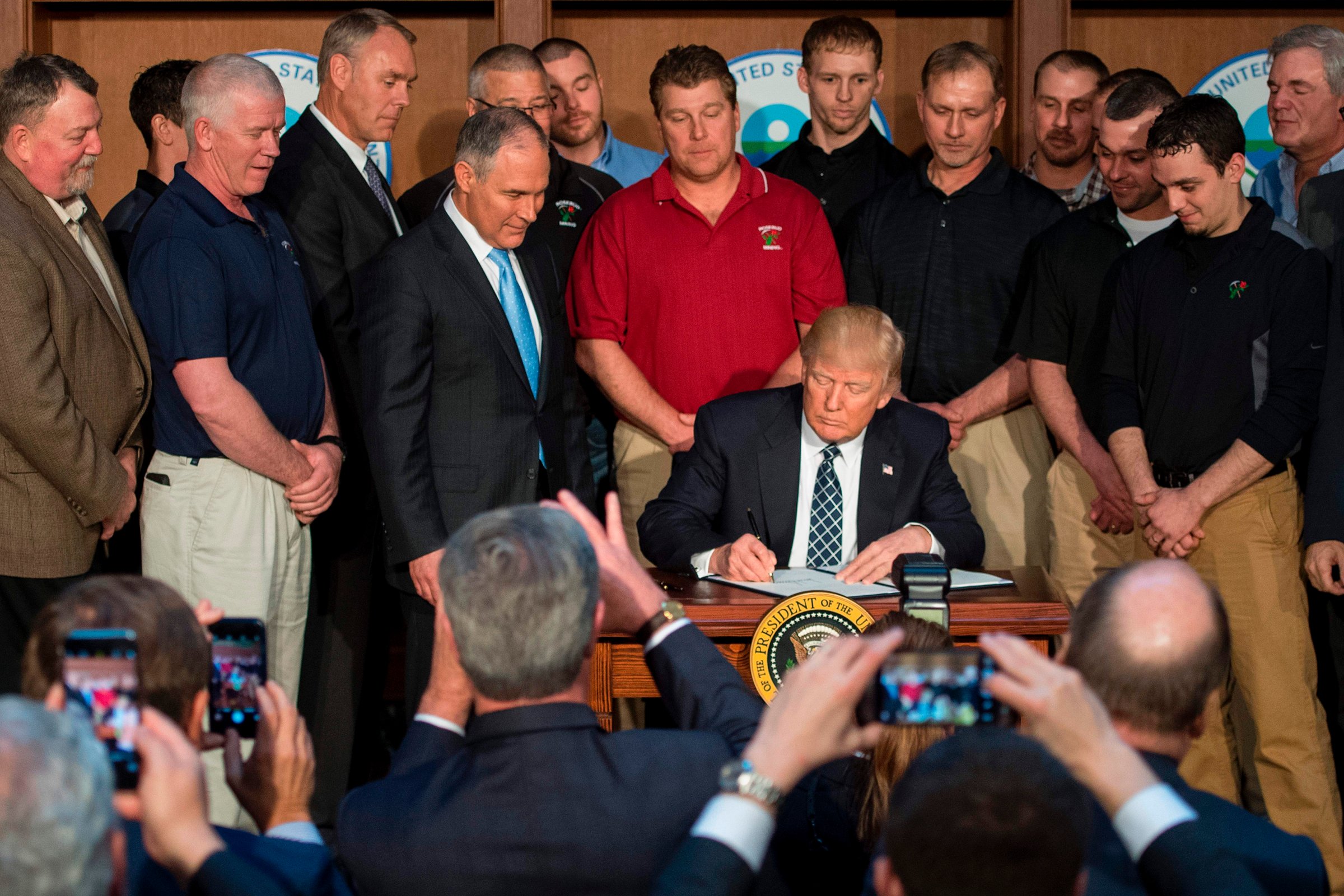
For years, fossil fuel companies have invested in think tanks and propaganda efforts designed to cast doubt on the science of climate change. But in recent weeks a number of those same companies—and the conservative lawmakers that support them—have joined a push to keep President Donald Trump from withdrawing from the historic international Paris Agreement on climate change.
The turnabout is not the result of newfound appreciation for the science that clearly shows how humans are causing global warming. Instead, U.S. coal interests have come to understand that deep public investment in technology to clean up energy production may be a last hope for the nation’s ailing coal industry. Carbon capture and sequestration technology, a key component of what is known in the industry as “clean coal,” keeps carbon dioxide emitted by coal-fired power plants from entering the atmosphere, reducing its contribution to global warming. But the technology is relatively new and expensive, and will likely remain out of reach without federal incentives and funding for research and development––which the goal of the Paris Agreement could provide.
“The path forward for ‘clean coal’ is a world in which we are taking very serious actions to address climate change,” says John Coequyt, climate policy director at the Sierra Club. “Then resources become available for emissions reductions technology.”
A bipartisan Congressional group has pushed funding for carbon capture research and development, but the efforts have often struggled to gain traction. In theory, more advanced carbon capture technology would allow utilities to continue operating coal-fired power plants while complying with regulations limiting carbon dioxide emissions. That, in turn, could help keep coal companies in business.
Under the Paris framework, which was reached in 2015 and took effect in early November, nations including China and the U.S. agreed to keep temperatures from rising more than 2°C (3.6°F) by 2100. Trump promised repeatedly on the campaign trail to “cancel” the deal, and while he cannot simply undo a multi-lateral international agreement, he could begin the years-long process of removing the U.S. and potentially imperil the entire plan.
But since taking office, Trump has reconsidered his promise following pressure from some voices in his administration, including his daughter Ivanka and her husband Jared Kushner. Secretary of State Rex Tillerson, who publicly supported action on climate change during his tenure at ExxonMobil, has also encouraged Trump to remain in the deal.
Read More: This Climate Change Measure Has Fossil Fuel Companies and Green Groups Working Together
Chief among the unlikely supporters of remaining in the Paris Agreement is Cloud Peak Energy, one of America’s largest coal producers. Cloud Peak CEO Colin Marshall wrote a letter to Trump saying that the U.S. could shape a “more rational” climate policy by remaining in the agreement. Arch Coal and Peabody Energy, two major coal companies, also signaled to Trump that they would not protest a decision to remain, according to a Politico report.
“Without U.S. leadership, the failed international policies that have characterized the past 25 years will continue to predominate,” he wrote. “Addressing climate concerns need not be a choice between prosperity or environment.”
U.S. Rep. Kevin Cramer, who advised Trump on energy policy during the campaign, has emerged as another supporter of remaining in the deal. The North Dakota Republican is asking his colleagues to support a letter to Trump making the case that remaining in the Paris Agreement is good for the energy industry. “The U.S. should use its seat at the Paris table to defend and promote our commercial interests, including our manufacturing and fossil fuel sector,” Cramer says in the letter. “We should work closely with our allies to develop, deploy, and commercialize cleaner technologies to help ensure a future for fossil fuels within the context of the global climate agenda.”
Read More: Donald Trump Says He’ll Bring Back Coal. Here’s Why He Can’t
To be sure, this surprising support comes with its own demands. Fossil fuel companies are asking that the U.S. revise the emissions targets set under the Obama administration and stop paying into the United Nations Green Climate Fund. It also prompts a larger question: why support efforts to reduce emissions at all—no matter the conditions—if you don’t believe in climate change in the first place?
The answers have resulted in some verbal gymnastics. Take West Virginia Gov. Jim Justice, who says he needs more data before he can be certain about climate change but has spoken to Trump about funding clean coal technology. “As we have umpteen, umpteen, umpteen more automobiles, and more carbon going into the atmosphere, it’s surely not going to hurt us to look at ways at extracting carbon,” Justice, a billionaire coal mine owner, tells TIME. “Whether you are a believer in climate change or you’re absolutely adamantly not, it’s still got to be good for us to look at ways of extracting some carbon.”
Roger Horton, a former coal miner who founded the advocacy group Citizens for Coal, believes concerns about carbon dioxide emissions are “overblown” and climate change regulations need to be overturned. But he also supports funding for carbon capture and sequestration research. “It’s a plain fact that there’s eight billion people and they’re exhaling carbon dioxide as well,” Horton says. But, when it comes to carbon capture technology, he says, “If we can do it in a way that’s economically viable then by all means we should do it.”
More Must-Reads From TIME
- The 100 Most Influential People of 2024
- The Revolution of Yulia Navalnaya
- 6 Compliments That Land Every Time
- What's the Deal With the Bitcoin Halving?
- If You're Dating Right Now , You're Brave: Column
- The AI That Could Heal a Divided Internet
- Fallout Is a Brilliant Model for the Future of Video Game Adaptations
- Want Weekly Recs on What to Watch, Read, and More? Sign Up for Worth Your Time
Write to Justin Worland at justin.worland@time.com